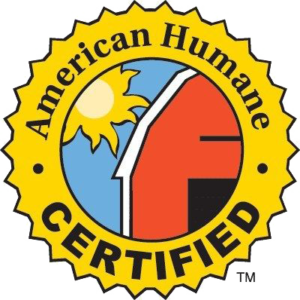About Our Program
American Humane created the first welfare certification program in the United States to help ensure the humane treatment of farm animals. The American Humane Certified™ program provides third-party, independent audits to help verify that certified producers’ care and handling of farm animals meet the science-based animal welfare standards of American Humane. The program provides ongoing outreach to farmers in the implementation of the best humane practices for animals.
Our Heritage
Since 1877, the American Humane has set the gold standard in animal welfare. Here are a few highlights of the legacy that we seek to expand, day by day, year after year.
1877 - American Humane addresses the humane transport of livestock on trains; enforces the 28-hour law.
1878 - American Humane calls for humane slaughter of animals.
1881 - American Humane condemns the premature shearing of sheep and the ocean transport of cattle.
1883 - American Humane opposes excessive branding of cattle.
1885 - American Humane opposes de-horning of cattle.
1886 - American Humane advocates for legislation that requires ranchers to adequately provide for and shelter animals grazing on federal rangeland.
1887 - American Humane addresses the inhumane overcrowding of poultry cages.
1902 - American Humane debates humane slaughter of farm animals.
1903 - American Humane launches programs to educate ranchers and the public on protecting animals that graze on the open range.
1904 - American Humane condemns current methods of slaughter and asks Congress to license and regulate slaughterhouses.
1913 - American Humane lobbies Congress on a "minimum speed bill" for trains to shorten trips for livestock.
1930 - American Humane pressures Congress to amend the 28-hour law to include trucks.
1945 - American Humane launches campaign to protect calves during livestock auctions.
1946 - American Humane pressures the Department of Agriculture to extend the 28-hour law to trucks, establishes regulation pen sizes, and creates feeding standards for animals in transit via trucks.
1951 - American Humane develops campaign to stop injuries during loading and unloading of cages during transport.
1952 - American Humane revisits humane slaughter issues.
1955 - American Humane supports bill requiring slaughterhouses to quickly and painlessly stun animals before slaughter. The federal law only applies to slaughterhouses that sell meat to the federal government, leaving some 13 million animals still unprotected.
1960 - American Humane takes humane slaughter campaign to states; certifies slaughterhouses.
1964 - American Humane leads legislative efforts to have trucks covered under 28-hour law. The efforts fail.
1971 - American Humane pushes effort to have another bill introduced to extend the 28-hour law. Bill fails to pass.
1971 - American Humane begins campaign to protect animals transported by air.
1974 - American Humane instrumental in legislation proposed to Congress to cover air shipment of animals.
1975 - The National Livestock Dealers and the American Trucking approach American Humane to develop guidelines.
1977 - American Humane supports amendment to the Animal Welfare Act to cover transportation of animals by air.
1977 - Final Humane Slaughter Act is passed.
1983 - American Humane works with dairy farmers to successfully oppose the Hot Iron Face branding requirement in the federal dairy buy-out termination program.
1989 - American Humane supports the Veal Calf Protection Act, which prohibits placing veal calves in crates that do not allow them to turn around or move.
1992 - American Humane supports the downed animal legislation, which prohibits the transportation of animals that are injured or sick.
1995 - American Humane is the only humane organization to serve on the Federal Advisory board, which writes the "Guide for the Care and Use of Agricultural Animals in Research and Teaching."
1996 - American Humane lobbies against the use of rBGH (bovine growth hormone) in dairy cows because of negative animal welfare implications.
2000 - American Humane creates animal welfare standards for farm animals; launches the American Humane Free Farmed™ program to improve the lives of farm animals.
2002 - American Humane expands the farm animal welfare certification program to include more producers and more products!
2007 - American Humane renames the Free Farmed program and develops the American Humane Certified™ label to reflect the broader scope of the American Humane certification program.
2009 - American Humane, to support the audit and certification process, launches innovative online registration and audit results database for producers.
2009 - American Humane launches online, classroom and in-barn training programs for all workers involved in the care and handling of farm animals.
2009 - American Humane launches "The Humane Table" consumer website to generate awareness, and promote the use, of products that have been certified as humanely raised.
2010 - American Humane certifies and endorses enriched colony housing as a humane alternative housing method for laying hens.
2010 - American Humane recognizes new method of controlled atmosphere stunning for poultry as humane.

Don’t see the American Humane Certified™ Seal of Approval?
Send this letter or learn more about what the seal means.
